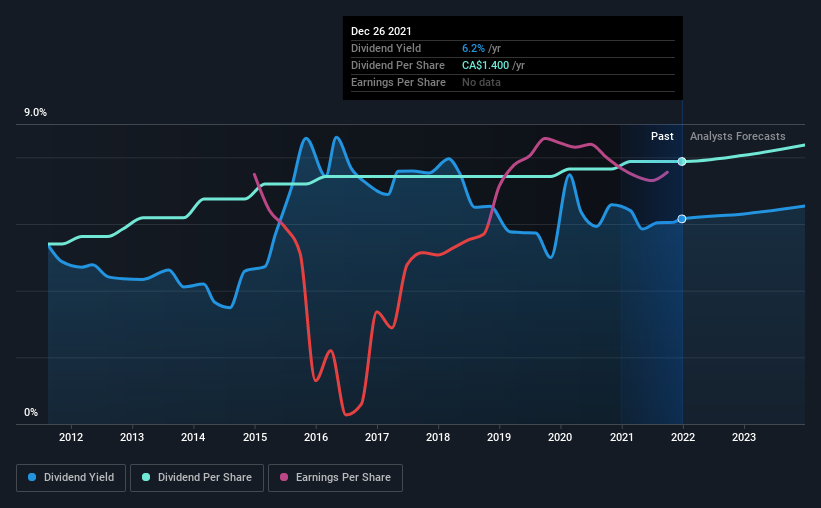Gibson Energy (TSE:GEI) Will Pay A Dividend Of CA$0.35
The board of Gibson Energy Inc. (TSE:GEI) has announced that it will pay a dividend of CA$0.35 per share on the 17th of January. This makes the dividend yield 6.2%, which will augment investor returns quite nicely.
See our latest analysis for Gibson Energy
Gibson Energy Is Paying Out More Than It Is Earning
If the payments aren't sustainable, a high yield for a few years won't matter that much. Before making this announcement, the company's dividend was much higher than its earnings. This situation certainly isn't ideal, and could place significant strain on the balance sheet if it continues.
Earnings per share is forecast to rise by 33.9% over the next year. If the dividend continues on its recent course, the payout ratio in 12 months could be 137%, which is a bit high and could start applying pressure to the balance sheet.
Gibson Energy Has A Solid Track Record
Even over a long history of paying dividends, the company's distributions have been remarkably stable. Since 2011, the first annual payment was CA$0.96, compared to the most recent full-year payment of CA$1.40. This means that it has been growing its distributions at 3.8% per annum over that time. Although we can't deny that the dividend has been remarkably stable in the past, the growth has been pretty muted.
Gibson Energy's Dividend Might Lack Growth
Some investors will be chomping at the bit to buy some of the company's stock based on its dividend history. Gibson Energy has seen EPS rising for the last five years, at 64% per annum. While EPS is growing rapidly, Gibson Energy paid out a very high 179% of its income as dividends. If earnings continue to grow, this dividend may be sustainable, but we think a payout this high definitely bears watching.
Gibson Energy's Dividend Doesn't Look Sustainable
Overall, we don't think this company makes a great dividend stock, even though the dividend wasn't cut this year. Although they have been consistent in the past, we think the payments are a little high to be sustained. This company is not in the top tier of income providing stocks.
Market movements attest to how highly valued a consistent dividend policy is compared to one which is more unpredictable. Still, investors need to consider a host of other factors, apart from dividend payments, when analysing a company. Case in point: We've spotted 4 warning signs for Gibson Energy (of which 2 are potentially serious!) you should know about. Looking for more high-yielding dividend ideas? Try our curated list of strong dividend payers.
Have feedback on this article? Concerned about the content? Get in touch with us directly. Alternatively, email editorial-team (at) simplywallst.com.
This article by Simply Wall St is general in nature. We provide commentary based on historical data and analyst forecasts only using an unbiased methodology and our articles are not intended to be financial advice. It does not constitute a recommendation to buy or sell any stock, and does not take account of your objectives, or your financial situation. We aim to bring you long-term focused analysis driven by fundamental data. Note that our analysis may not factor in the latest price-sensitive company announcements or qualitative material. Simply Wall St has no position in any stocks mentioned.

 Yahoo Finance
Yahoo Finance 
